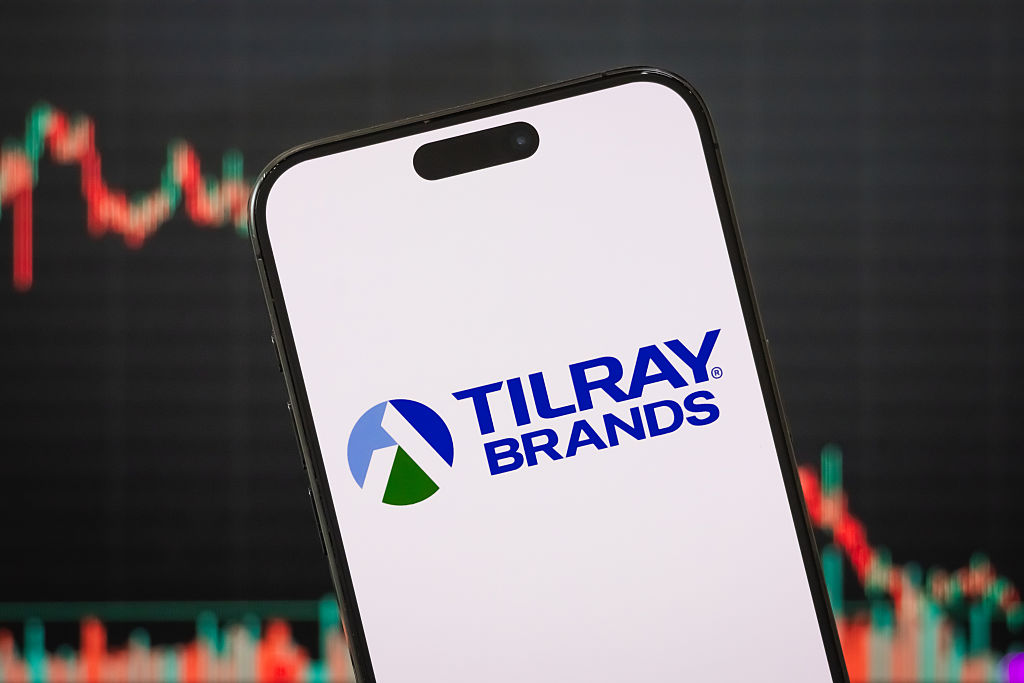Best Marijuana Stocks to Buy: Cannabis Stocks for Investing
The best marijuana stocks have been put through the wringer for years. But with U.S. cannabis sales on the rise, these picks could finally have their day in the sun.

Karee Venema

Profit and prosper with the best of Kiplinger's advice on investing, taxes, retirement, personal finance and much more. Delivered daily. Enter your email in the box and click Sign Me Up.
You are now subscribed
Your newsletter sign-up was successful
Want to add more newsletters?

Delivered daily
Kiplinger Today
Profit and prosper with the best of Kiplinger's advice on investing, taxes, retirement, personal finance and much more delivered daily. Smart money moves start here.

Sent five days a week
Kiplinger A Step Ahead
Get practical help to make better financial decisions in your everyday life, from spending to savings on top deals.

Delivered daily
Kiplinger Closing Bell
Get today's biggest financial and investing headlines delivered to your inbox every day the U.S. stock market is open.

Sent twice a week
Kiplinger Adviser Intel
Financial pros across the country share best practices and fresh tactics to preserve and grow your wealth.

Delivered weekly
Kiplinger Tax Tips
Trim your federal and state tax bills with practical tax-planning and tax-cutting strategies.

Sent twice a week
Kiplinger Retirement Tips
Your twice-a-week guide to planning and enjoying a financially secure and richly rewarding retirement

Sent bimonthly.
Kiplinger Adviser Angle
Insights for advisers, wealth managers and other financial professionals.

Sent twice a week
Kiplinger Investing Weekly
Your twice-a-week roundup of promising stocks, funds, companies and industries you should consider, ones you should avoid, and why.

Sent weekly for six weeks
Kiplinger Invest for Retirement
Your step-by-step six-part series on how to invest for retirement, from devising a successful strategy to exactly which investments to choose.
Marijuana stocks have given cannabis investors nothing but false starts over the past few years.
The industry has struggled with a plethora of issues, including delays by the federal government to legalize cannabis nationwide, inflation, overproduction, lack of capital, job losses and cratering stock prices amid a broader market sell-off in early 2025.
It's pretty grim until you consider the cannabis industry's contribution to the American economy.
According to the latest update to the MJBiz Factbook, the total impact of regulated cannabis sales in 2025 could be over $124 billion, 9% higher than in 2024. That's pretty good for an industry some consider to be on its deathbed.
Estimates suggest the total economic impact in the U.S. from cannabis could reach $200 billion by 2030.
While the likelihood of marijuana reform in the U.S. in 2025 is almost non-existent, the number of states where cannabis is legal continues to grow.
Currently, there are only nine states where neither medical nor recreational-use marijuana is legal, while there are 24, plus the District of Columbia, where both are legal.
The industry is well past the tipping point.
Investors who hold the industry's best stocks to buy and the top exchange-traded funds (ETFs) – and perhaps a bit more patience – should be best-positioned for marijuana's eventual renaissance.
Ultimately, the following picks look like the best marijuana stocks (and fund) to benefit from this ongoing growth and maturation.
Data is as of May 12. Dividend yields are calculated by annualizing the most recent payout and dividing by the share price.

British American Tobacco
- Market value: $89.9 billion
- Dividend yield: 6.9%
British American Tobacco (BTI, $40.98) is one of the world's largest cigarette and tobacco companies. Its key cigarette brands include Dunhill, Kent, Lucky Strike, Newport and Camel. Its smokeless brands include Vuse (vape), glo (heated), Velo (modern oral) and Grizzly (traditional oral).
In 2024, its global revenue was $34.68 billion, with adjusted EBITDA (earnings before interest, taxes, depreciation and amortization) of $15.94 billion. Its New Category segment, which includes its Vuse, glo and Velo brands, saw revenue increase by 8.9% in 2024, accounting for 13% of British American Tobacco's overall sales.
Between 2017 and 2023, the global compound annual growth rate of nicotine revenue was 3.8%. With the industry moving to smokeless products, revenue is expected to grow by 4.6% annually between 2024 and 2035.
Tobacco businesses with cannabis investments are an attractive way for investors to make a bet on the newish industry without taking excessive risk. British American Tobacco, for example, generates significant free cash flow, some of which is used to pay its healthy dividends.
The company's involvement with cannabis began in March 2021 when it entered into a strategic product development partnership with Organigram Global (OGI), a licensed Canadian cannabis producer for the medical and recreational markets. As part of the agreement, BTI invested $159.6 million in Organigram, giving it 19.9% of the company.
British American Tobacco and Organigram announced on February 28 that the third and final tranche of BTI’s $90.0 million follow-on equity investment in Organigram had been completed. These funds have been used to invest in the partnership's Jupiter strategic investment pool, which includes a $15.2 million investment in a German cannabis company, Sanity Group.
British American Tobacco now owns 30% of Organigram, according to S&P Global Market Intelligence.

SNDL
- Market value: $339.6 million
- Dividend yield: N/A
Like many cannabis stocks, SNDL (SNDL, $1.32) once enjoyed a much greater valuation. In February 2021, the quasi-investment firm, cannabis producer, cannabis retailer, and liquor retailer traded above $20.
SNDL stock bottomed in April 2023 and has traded sideways in the 24 months since.
The company's cannabis brands include Topleaf, Contrabrand and Palmetto. In November 2024, it acquired the business and assets of Canadian edibles producer Indiva from bankruptcy protection for $16.4 million. This brought edibles brands Pearls by Grön, No Future and Bhang Chocolate as well as a 40,000-square-foot production facility into SNDL's fold.
SNDL's cannabis retail business consists of 219 stores across Canada operating under banners such as Spiritleaf, Value Buds and Superette. It finished 2024 with 67 Spiritleaf stores (8 corporate and 59 franchised), 117 Value Buds stores (all company-owned), and one Superette corporate store.
On April 9, SNDL announced that it had acquired 32 cannabis stores operating under the Cost Cannabis and T Cannabis banners in Ontario, Alberta and Saskatchewan. It paid $23.3 million for the stores, generating revenue of $38.4 million, bringing its total store count to 219 across Canada.
The third operating segment of SNDL's business is liquor retail. Its banners include Ace Liquor (133 locations as of December 31), Liquor Depot (19), and Wine and Beyond (13), with locations in Alberta and B.C.
Liquor retail generated 57% of its 2024 revenue, followed by cannabis retail (32%) and cannabis brands (11%).
The company continues to lose money – its operating loss in 2024 was $75.2 million, but that was narrower than the $118.2 million loss a year earlier – but it's made significant progress toward profitability.
With positive free cash flow of $6.4 million in 2024, reversing $44.1 million in free cash flow burned in 2023, SNDL's effective capital allocation makes it a stock worth watching for an eventual cannabis turnaround.

Trulieve Cannabis
- Market value: $821.6 million
- Dividend yield: N/A
Trulieve Cannabis (TCNNF, $4.31) is a vertically integrated multi-state operator (MSO) based in Tallahassee, Florida. Its assets include 15 cultivation and processing operations in six states and 226 operational dispensaries in eight states, including 160 in Florida.
It offers products at three price points: Premium (Avenue, Muse, Cultivar Collection), Mid (Alchemy, Modern Flower, Momenta and Sweet Talk) and Value (Roll One, LoveLi and Colors).
In February 2025, Trulieve launched Onward, a Farm Bill-compliant THC-infused beverage, with flavors that include Blueberry Mojito, Italian Spritz, Passionfruit Martini, Peach Bellini, and Sea Salt Margarita. In addition to the various flavors, the drinks are available with 3 mg (milligrams) of THC and CBD, 5 mg, and 10 mg.
Onward is sold online in 36 states through its DrinkOnward.com website and at Total Wine locations in major cities across Florida. On March 26, it announced expanded distribution of Onward in select Shores Liquor and ABC Fine Wine & Spirits in Florida.
In 2024, Trulieve reported a 5% year-over-year increase in revenue to $1.19 billion. Its adjusted net loss narrowed to $19.0 million from $70.0 million, and its gross profit margin improved to 60% from 52% in 2023.
In 2022, it had adjusted EBITDA of $398.2 million, or 32.7% of revenue. By the end of 2024, it had increased to $420.2 million, 35.4% of revenue.
Trulieve is one of Wall Street's favorite cannabis stocks. Of the 10 analysts who follow the health care stock, nine give it a Strong Buy and have it at Buy, with a median target price of $12.41, nearly three times its current share price.

Tilray Brands
- Market value: $466.6 million
- Dividend yield: N/A
The cannabis industry has faced major headwinds since Tilray Brands (TLRY, $0.46) merged with Aphria in May 2021, most significantly the U.S. government dragging its heels on federal legalization.
The uncertainty has knocked down Tilray's share price by more than 98%. And CEO Irwin Simon has been forced to develop a plan to make Tilray competitive no matter the regulatory environment for cannabis in the U.S.
That's why the company pivoted to beer and premium spirits to fill the gap in revenue and profit caused by the legalization delay at the federal level.
In April 2025, Tilray's U.S. beverage division became the fourth-largest craft brewer in the U.S., according to the Brewers Association 2024 annual report. The ranking, which is based on beer sales volume, also makes it the 12th-largest brewer of any size.
Tilray entered the craft beer industry by acquiring SweetWater Brewing for $300 million in November 2020. Simon has spent an additional $150 million to acquire 15 more beer brands in the four years since, including a December 2021 deal to acquire Colorado-based Breckenridge for $103 million.
Its craft beer brands now include SweetWater and Breckenridge as well as Shock Top, Redhook, Terrapin Beer and Square Mile Cider. In the nine months ended February 28, Tilray's beverage business accounted for 29% of its $596.8 million in annual revenue. Distribution still commands top share at 33%, followed by cannabis at 31% and wellness at 7%.
Ultimately, Simon believes its alcohol beverage distribution network combined with eventual federal legalization should enable Tilray to generate substantial future revenue from cannabis-infused beverages coast to coast in the U.S.
Simon continues to pull different levers to add value for shareholders such as a proposed reverse stock split at a ratio between 1 for 10 and 1 for 20 that will be voted on in June.
Despite Tilray's challenges in its cannabis and beverage businesses, analysts aren't all that pessimistic about its future. Of the 12 who cover the stock, four rate it a Buy and eight rate it Hold. The median 12-month target price is $1.00, upside of 117.4% from TLRY's recent closing price.
Aggressive investors might consider Tilray at these prices – but be prepared for everything a high-risk, high-reward investment entails.

Cambria Cannabis ETF
- Assets under management: $11.7 million
- Expenses: 0.43%, or $43 annually on a $10,000 investment
The Cambria Cannabis ETF (TOKE, $4.59) launched in July 2019. TOKE stands out because it has the lowest expense ratio of all the major cannabis ETFs.
Compared to the AdvisorShares Pure US Cannabis ETF (MSOS), the Cambria ETF is tiny, with assets just 3% of MSOS's $343 million, despite an inception date 14 months earlier.
However, what TOKE lacks in size it makes up for with year-to-date performance during a volatile 2025. TOKE was down just 4.6% through April 30 vs a loss of 16.8% for MSOS.
TOKE is actively co-managed by Cambria founder and Chief Investment Officer Meb Faber and Chief Operating Officer Jonathan Keetz.
The fund looks to own between 20 and 50 top global cannabis companies. It has 24 holdings, with the top 10 accounting for nearly 67% of its portfolio.
Interestingly, and probably wisely, its largest holding is an 11.16% weighting in the First American Treasury Obligations Fund (FXFXX), indicating that the portfolio managers don't see too many compelling buys in the cannabis arena in 2025.
That could change with the federal decriminalization of cannabis, an ongoing thorn in the side of the industry's growth ambitions.
While MSOS focuses on U.S. multi-state producers and retailers, Faber's ETF looks beyond America as well as into related industries such as tobacco and real estate and food and beverages.
Five of its top 10 holdings are tobacco companies, including Philip Morris (PM) and Imperial Brands (IMBBF) with 6.64% and 5.87% weightings, respectively.
It even holds derivative swaps in Jones Soda (JSDA), a one-time consumer favorite, that's looking for another shot in 2025 to regain its place among soda drinkers by taking Pop Jones, its natural line of probiotic sodas, nationwide. Launched online in September 2024, the product is available in more than 1,500 stores across the U.S.
If you're an aggressive investor and believe federal legalization will happen, TOKE provides cannabis diversification and a reasonable management fee.
Learn more about TOKE at the Cambria Funds provider site.
Related content
Profit and prosper with the best of Kiplinger's advice on investing, taxes, retirement, personal finance and much more. Delivered daily. Enter your email in the box and click Sign Me Up.

Will has written professionally for investment and finance publications in both the U.S. and Canada since 2004. A native of Toronto, Canada, his sole objective is to help people become better and more informed investors. Fascinated by how companies make money, he's a keen student of business history. Married and now living in Halifax, Nova Scotia, he's also got an interest in equity and debt crowdfunding.
- Karee VenemaSenior Investing Editor, Kiplinger.com
-
 Nasdaq Leads a Rocky Risk-On Rally: Stock Market Today
Nasdaq Leads a Rocky Risk-On Rally: Stock Market TodayAnother worrying bout of late-session weakness couldn't take down the main equity indexes on Wednesday.
-
 Quiz: Do You Know How to Avoid the "Medigap Trap?"
Quiz: Do You Know How to Avoid the "Medigap Trap?"Quiz Test your basic knowledge of the "Medigap Trap" in our quick quiz.
-
 5 Top Tax-Efficient Mutual Funds for Smarter Investing
5 Top Tax-Efficient Mutual Funds for Smarter InvestingMutual funds are many things, but "tax-friendly" usually isn't one of them. These are the exceptions.
-
 Nasdaq Leads a Rocky Risk-On Rally: Stock Market Today
Nasdaq Leads a Rocky Risk-On Rally: Stock Market TodayAnother worrying bout of late-session weakness couldn't take down the main equity indexes on Wednesday.
-
 5 Top Tax-Efficient Mutual Funds for Smarter Investing
5 Top Tax-Efficient Mutual Funds for Smarter InvestingMutual funds are many things, but "tax-friendly" usually isn't one of them. These are the exceptions.
-
 Why Invest In Mutual Funds When ETFs Exist?
Why Invest In Mutual Funds When ETFs Exist?Exchange-traded funds are cheaper, more tax-efficient and more flexible. But don't put mutual funds out to pasture quite yet.
-
 Social Security Break-Even Math Is Helpful, But Don't Let It Dictate When You'll File
Social Security Break-Even Math Is Helpful, But Don't Let It Dictate When You'll FileYour Social Security break-even age tells you how long you'd need to live for delaying to pay off, but shouldn't be the sole basis for deciding when to claim.
-
 I'm an Opportunity Zone Pro: This Is How to Deliver Roth-Like Tax-Free Growth (Without Contribution Limits)
I'm an Opportunity Zone Pro: This Is How to Deliver Roth-Like Tax-Free Growth (Without Contribution Limits)Investors who combine Roth IRAs, the gold standard of tax-free savings, with qualified opportunity funds could enjoy decades of tax-free growth.
-
 One of the Most Powerful Wealth-Building Moves a Woman Can Make: A Midcareer Pivot
One of the Most Powerful Wealth-Building Moves a Woman Can Make: A Midcareer PivotIf it feels like you can't sustain what you're doing for the next 20 years, it's time for an honest look at what's draining you and what energizes you.
-
 Stocks Make More Big Up and Down Moves: Stock Market Today
Stocks Make More Big Up and Down Moves: Stock Market TodayThe impact of revolutionary technology has replaced world-changing trade policy as the major variable for markets, with mixed results for sectors and stocks.
-
 I'm a Wealth Adviser Obsessed With Mahjong: Here Are 8 Ways It Can Teach Us How to Manage Our Money
I'm a Wealth Adviser Obsessed With Mahjong: Here Are 8 Ways It Can Teach Us How to Manage Our MoneyThis increasingly popular Chinese game can teach us not only how to help manage our money but also how important it is to connect with other people.
